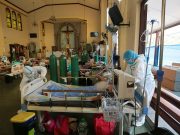The future of work and workers
By Bernardo M. Villegas
Of late, there have been numerous articles appearing in both domestic and international media about the “future of work.” Understandably, most of them focus on such topics as working from home; closing the future skills gap in the digital sector; achieving more productive, efficient and meaningful interactions through innovative workplace technologies; and similar trends that have been intensified by the COVID-19 pandemic.
In navigating e-commerce, new online sellers need help too
WITH mall shopping now a distant memory for many, how has the process of enticing customers to buy your wares changed in the e-commerce age?
Malls try to get a grip on the shifting retail environment
FOR the time being, shopping in malls for leisure is a thing of the past, thanks to the coronavirus disease 2019 (COVID-19) pandemic. If and when we do enter a mall, it is for quick in-and-out transactions for essentials, not pleasure. This does not mean that wants have taken a back seat. Walks in the mall have been replaced in the meantime by long swipes of the finger or clicks of the mouse down e-commerce platforms, each scroll replacing the once-normal ritual of browsing.
Schools team up with couriers, banks to help students deal with pandemic
SCHOOLS in the Philippines have entered tie-ups with logistics service providers and banks to help students better deal with the impact of the global health emergency.
Mass transport one of the keys to economic recovery
OF THE many that need to happen for the economy to recover, perhaps the most overlooked is the state of the mass transport industry.
The ‘workcation’ provides a lifeline to tourist destinations
THERE’S not much for tourism businesses to do but wait. After global travel stopped in March 2020, many shuttered completely — except for hotels offering quarantine rooms and serving the occasional demand for “workcations.”
Hospital recovery to hinge on staff availability, collections
HOSPITALS are hanging on as coronavirus surges come and go, but their long-term health will ultimately depend on finding adequate numbers of staff and collecting on their receivables from the national health insurer, among others.
Building on the momentum of success at the Tokyo Olympics
The 32nd Summer Olympics in Tokyo turned out to be an edition to remember, with the multi-medal haul, including a first gold, a watershed moment for Philippine sports.
A resilient food supply starts with modernization
When many parts of the country, including some of the biggest markets, went into lockdown in March 2020 to contain the coronavirus outbreak, farmers, even the ones outside the quarantine zone, had to dump their crops by the roadside for lack of a way to bring the produce to where the buyers were.
The pandemic is forcing the world
“Now is the time to rethink what we want city centers to be like, to repurpose prime urban real estate for mixed use, and build urban areas with a focus on community, accessibility, inclusion, and sustainability,” said Paul D. Priestman, founder and chair of PriestmanGoode, a design consultancy out of the UK that counts Airbus SE and Hong Kong’s Mass Transit Railway as its clients.
NFTs as the future of digital entertainment
PRIOR to the pandemic, barely anyone knew of non-fungible tokens (NFTs). These digital assets — like bitcoin and ether — are traded using blockchain technology. But unlike cryptocurrencies, they are unique (hence non-fungible).
Fintech’s key roles in achieving financial inclusion
ONE OF the most notable shifts seen during the coronavirus disease 2019 (COVID-19) pandemic is the growing use of digital payments. Although cash and coins are still used, electronic wallets and digital services were further appreciated for the conveniences they provide.

















